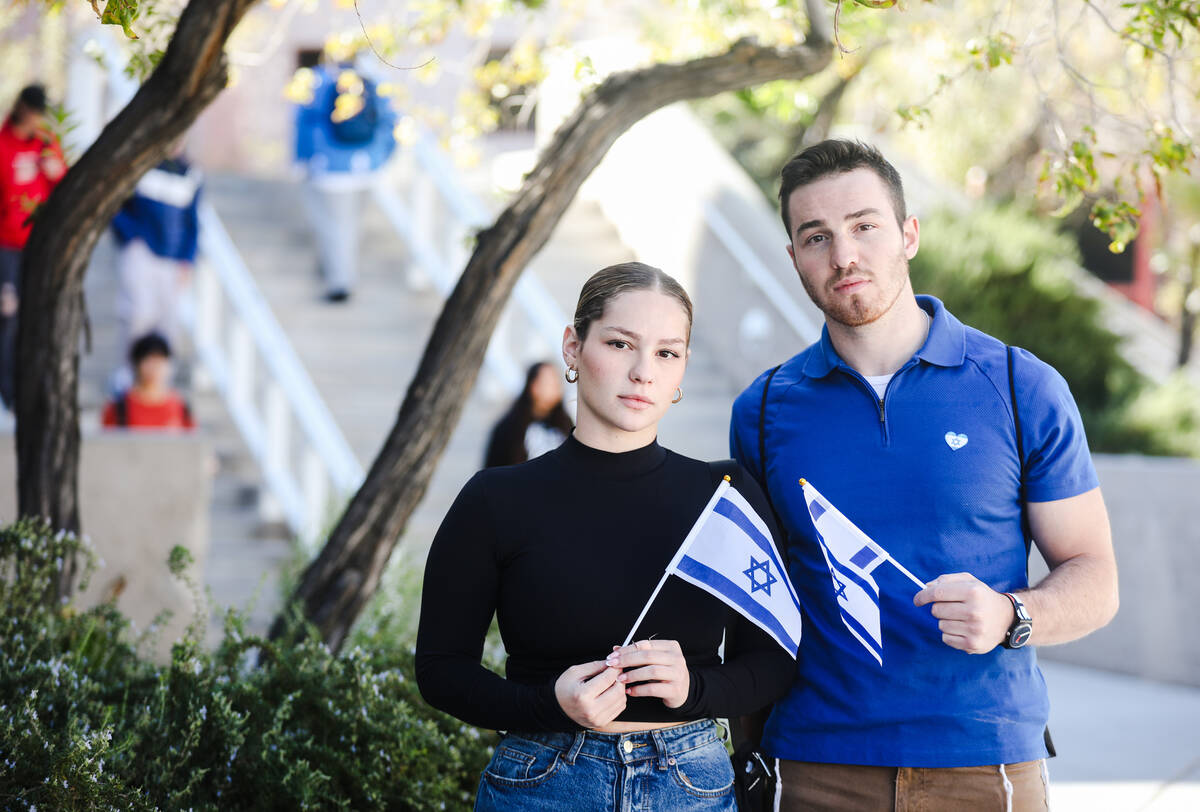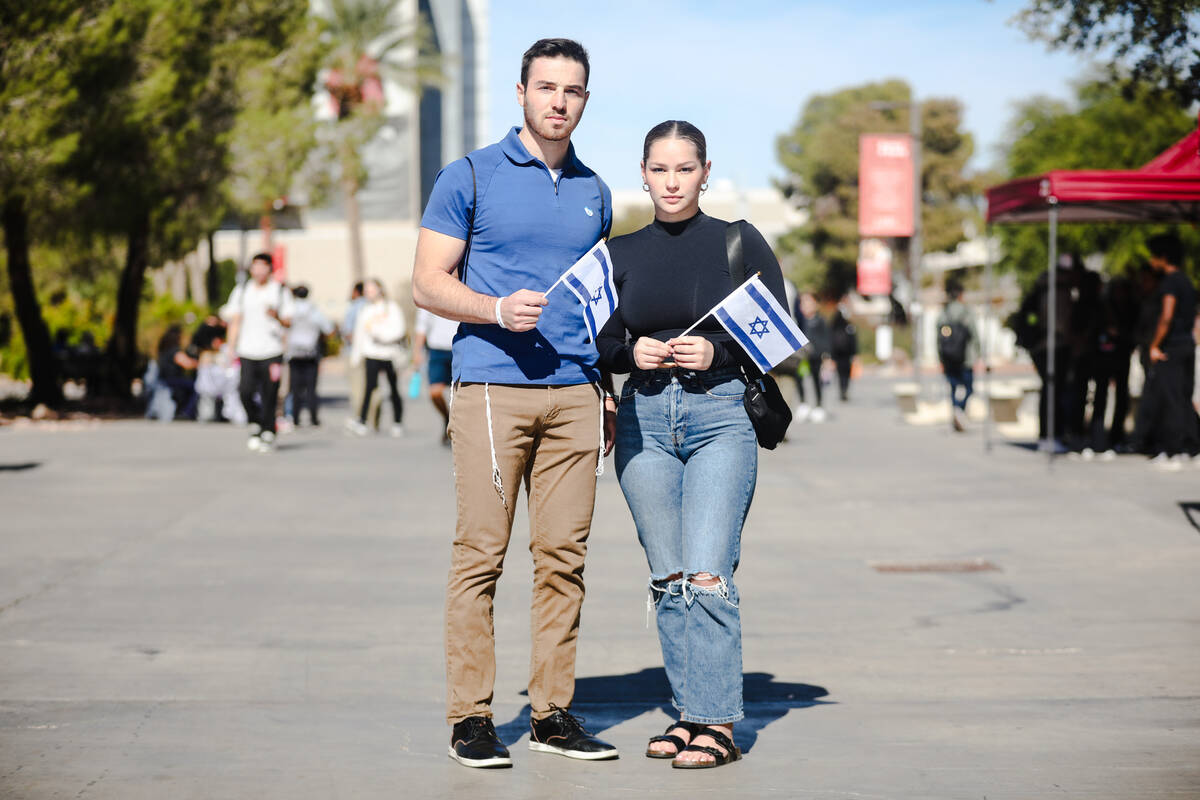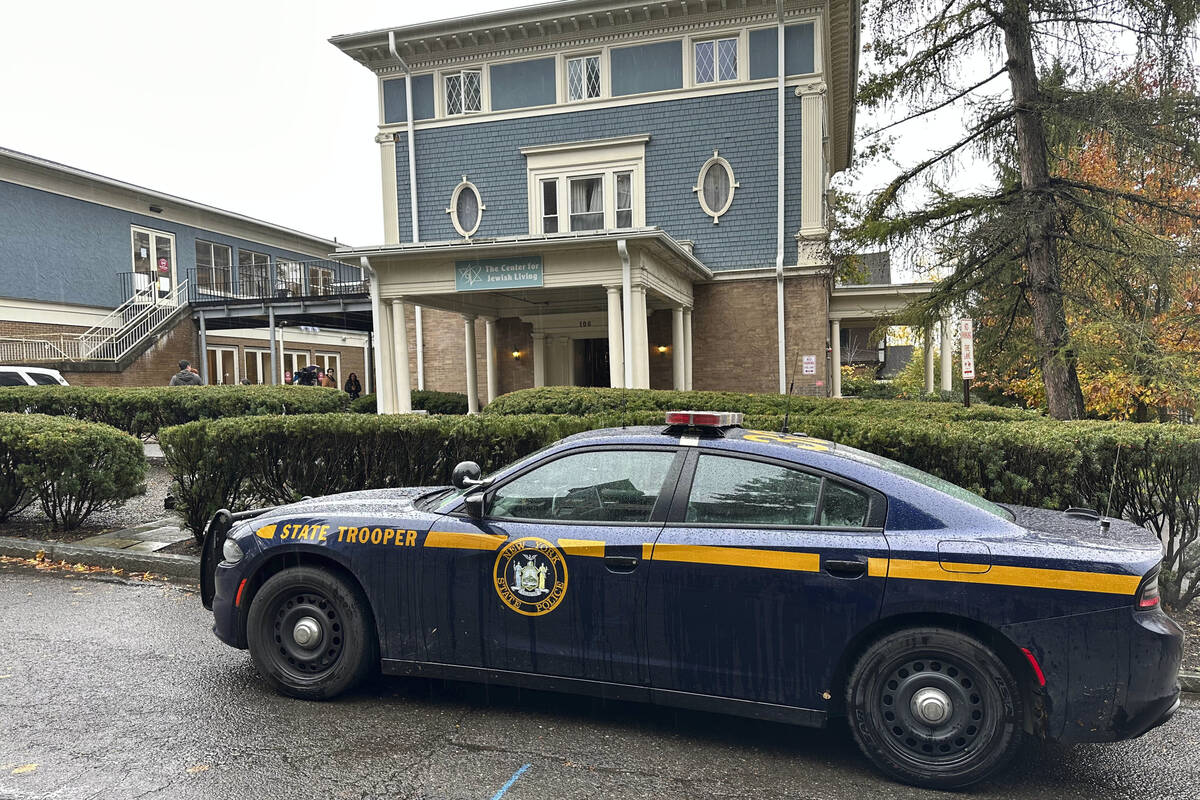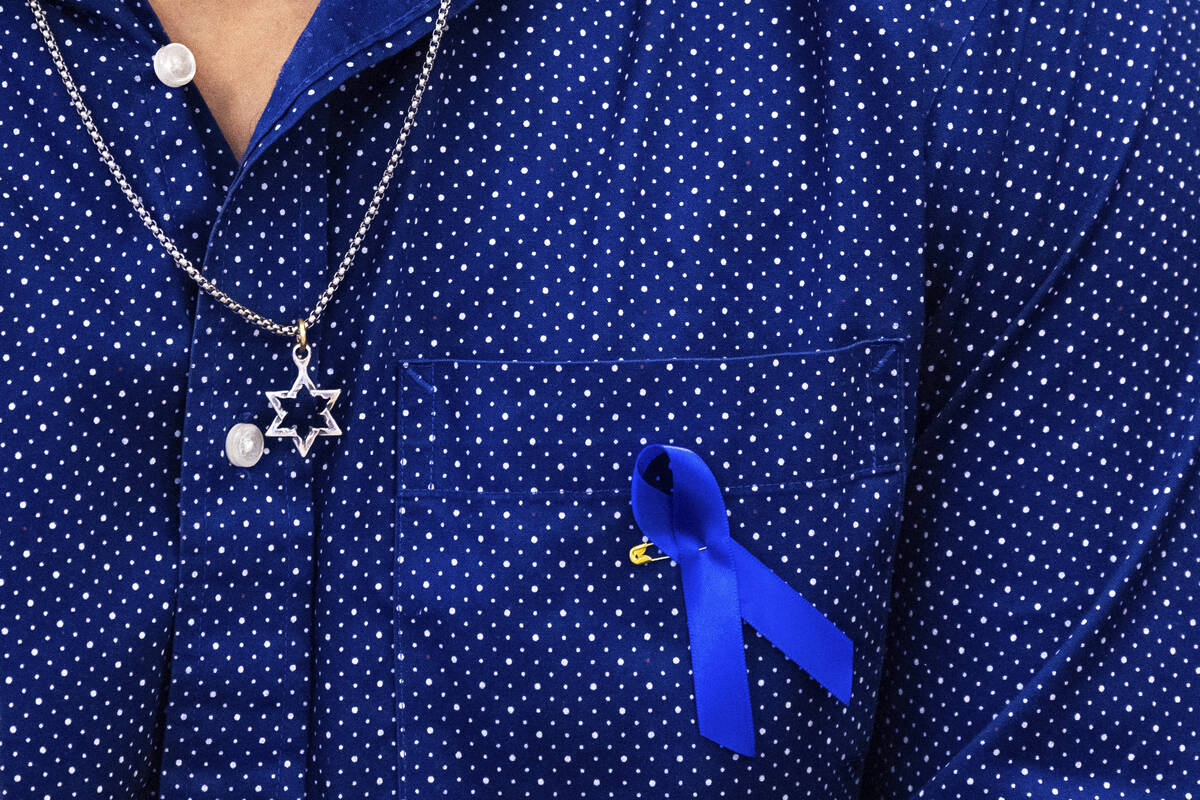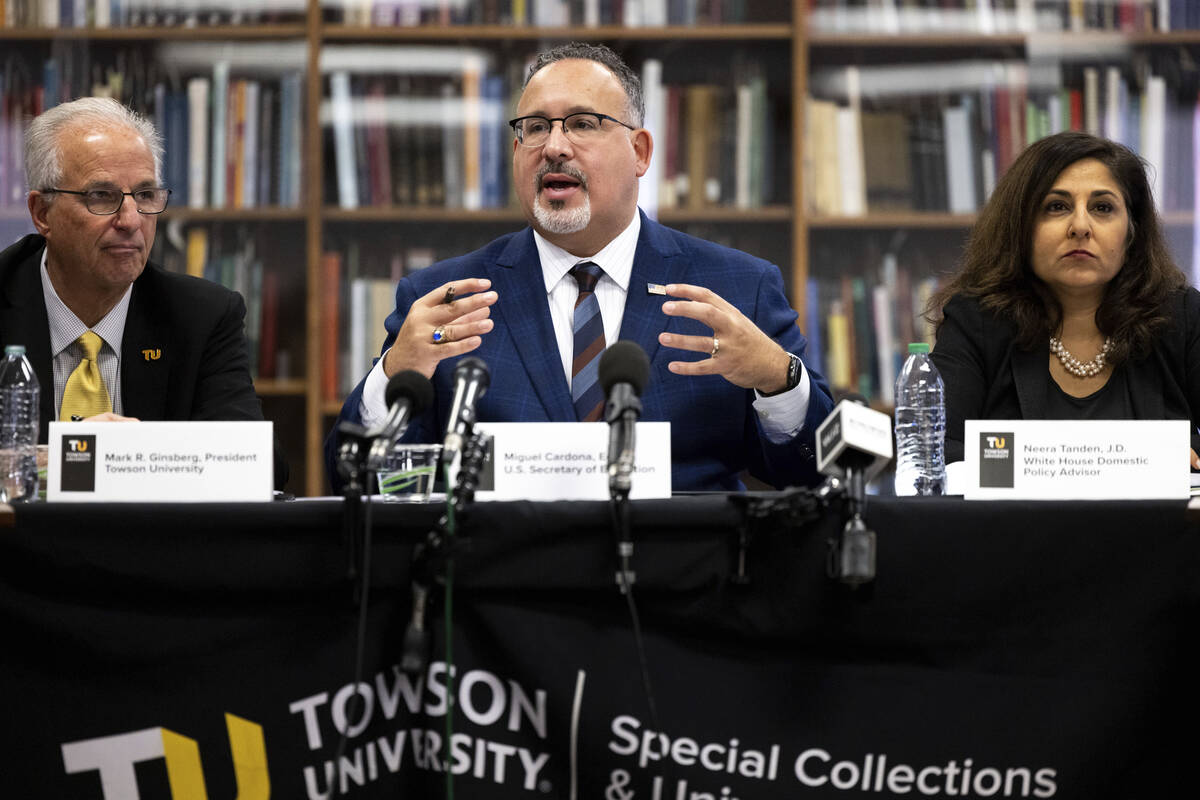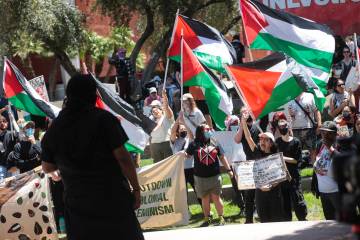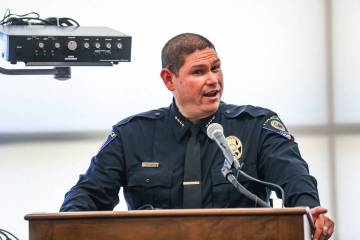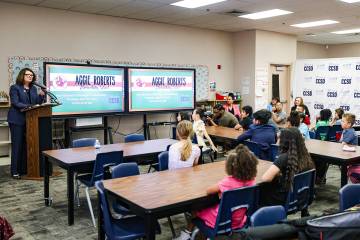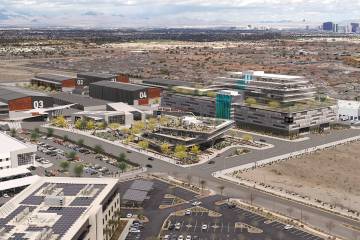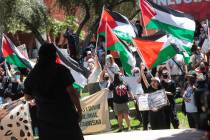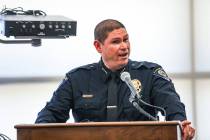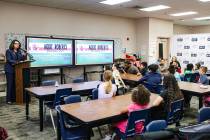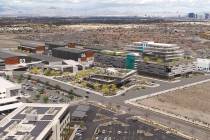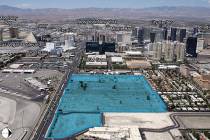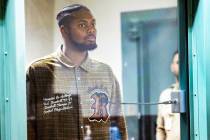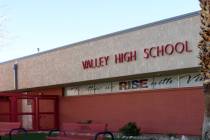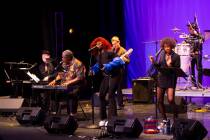Antisemitic incidents at UNLV increase fears among Jewish students
It was a small gathering, voices low, anxieties high.
On Monday, Oct. 9, Rosie Polonsky joined around 20 of her fellow University of Nevada, Las Vegas students at a rally on campus in support of Israel, which had been attacked by Hamas terrorists two days earlier.
She and brother Aaron Polonsky, a fellow UNLV student and president of The Jewish Law Student Association, were still in a state of shock, numb from the news.
When Hamas launched its assault, they were celebrating the Jewish holiday of Simchat Torah, which prohibits the use of electronic devices, at a local rabbi’s house.
They didn’t learn of the horrors until Sunday night, when the holiday was over and the worrying began upon learning of the carnage.
“It’s one of the happiest days on the Jewish calendar,” Aaron says, sitting next to his sister on the ground floor of UNLV’s Flora Dungan Humanities Building on a recent Wednesday afternoon, speaking in alternately grave and galled tones. “We’re there celebrating, happy, and all of a sudden you hear these bombshells and it just killed the happiness.
“It went from a day of celebration to a day of prayer, and just hoping everything’s not as bad as they’re saying,” he continues. “My initial reaction was, ‘Okay, what are we going to do about this in America?’”
For his sister, the first steps were to attend the aforementioned gathering.
She got there while the demonstration, organized by the UNLV chapter of Students Supporting Israel, was still being set up.
She was carrying an Israeli flag.
“It was very quiet. There wasn’t a loud demonstration,” Polonsky recalls. “A girl passed by and looked at me. She was angry.
“She took a picture of me, she flipped me off, she said ‘F.U.,’ — but said it for real,” she continues. “In that moment, my heart started, like, racing. I couldn’t believe it. I just stood there with the Israeli flag, and a girl spewed hate at me. I wasn’t standing there saying, ‘I hate Hamas.’ That was shocking to me.”
Equally shocking: After the Hamas attack on Oct. 7, the Anti-Defamation League Center on Extremism has recorded a 388 percent increase in reported antisemitic incidents of harassment, vandalism and assault over the same period last year.
The next week, Polonsky, a senior studying hospitality, who also has a younger sister at UNLV, attended another pro-Israel rally on campus.
“A group of students came by, and they spit at us,” she says. “They said, ‘Stop killing our babies.’”
In the past month, college campuses across the country have been boiling over with student divisiveness as the conflict in Israel has ignited a powder keg of protest, with pro-Israel and pro-Palestine groups clashing at universities ranging from UCLA to Harvard, New York University to Penn University.
There have been student walkouts at Howard University, online threats made against Jewish students at Cornell University, and dueling student protests at Columbia University sizable enough to spur school administrators to temporarily close campus as a precautionary measure over safety concerns.
Even UNLV, a university not known for protests, has gotten a taste of the tension.
Occasionally, it’s gotten ugly.
“Experiencing antisemitism firsthand on my college campus where I’m here all the time, where my siblings are, I have Jewish friends here, it’s a safe place that we’re supposed to be in,” Polonsky says. “To feel hate, it hurts.”
A long of history of protest … just not at UNLV
It’s an American college tradition as old as American colleges themselves.
The nation’s first student demonstration, the Butter Rebellion of 1766, took place at the nation’s first college, Harvard University, founded in 1636.
Students have been protesting with university faculty — and among themselves — ever since, though what they’ve protested has grown far more serious than the quality of the dairy products served on campus.
Perhaps the most widespread example of such occurred during the civil rights movement of the 1950s and ’60s and the overlapping Vietnam War era, which catalyzed abundant campus demonstrations, the latter begetting the infamous Kent State shootings in 1970, where four students were shot and killed by the Ohio National Guard.
In more recent times, the 2020 killing of George Floyd at the hand of a Minneapolis police officer led to nationwide campus unrest.
Because universities are populated by young people often being exposed to new ideas and viewpoints that may challenge their assumptions of the world around them, college campuses have the power to serve as natural incubators of collective activism.
“It’s an important time in people’s lives,” says Michael Green, a UNLV history professor and alum who got his doctorate at Columbia University. “They are studying issues they may not have studied before. This is also a time when you’ve come out of high school, and you probably have not thought a lot about politics. Our job, I like to say, is not to teach the answers — unless they’re factual — but teach how to ask questions.”
Nevertheless, UNLV has never been particularly fertile ground for such protests, according to Green.
“The history is a bit limited,” he notes. “I think one of the main reasons is that UNLV — even with a good number of dormitories and students living on campus — has a history as a commuter school, and students who also work one or two jobs, and have a lot of other things going on.”
This is a sentiment that Gaia Steinberg, president of the UNLV chapter of Students Supporting Israel, has tended to agree with.
Until recently.
“I’ve always thought of UNLV to be a very apathetic campus,” she says. “It’s difficult to get students to really show up to anything besides classes, and they’re really just there to get their degrees and leave.
“But with this whole situation, I’m seeing a rise of students who are strongly opinionated in a way that’s making me feel unsafe,” she continues of the reaction to the turmoil in Israel. “Now, it’s difficult to get students to show up in a different way: Because they’re afraid. We’re just seeing a lot of hate rise up.”
‘An uncomfortable atmosphere’
He didn’t think his words would provoke a pushback until they did just that.
In the aftermath of the Hamas terrorist assault, The Jewish Law Student Association issued a statement denouncing the attacks, which Aaron Polonsky helped author.
“The recent acts of violence perpetrated by Hamas have caused immense suffering to both Israeli and Palestinian communities,” it reads in part. “We unequivocally condemn any acts of terror and violence that target innocent civilians and undermine the principles of peace, coexistence, and human rights.”
“I figured that was a statement out there letting Jewish students know they’re not alone and there’s something here,” Polonsky says. “You’d think that would be it.”
It was not.
Two days later, UNLV’s Middle Eastern Law Students Association issued a statement in response, which also condemned the attacks and pledged solidarity with the JLSA, but took issue with Israel’s treatment of Palestinian civilians and alleged a checkered past for the country in the region.
“Just as we stand against the heinous attacks on Israeli civilians, we also hope that there is new urgency in seeing the need to work toward a just peace that respects the full equality and dignity of Palestinians,” a portion of the statement read.
Similarly, a statement by UNLV President Keith E. Whitfield citing “reprehensible” “atrocities” committed by Hamas has been criticized by some student organizations for not being considerate enough of Palestinians as the war’s death toll rises.
“Where is your concern for Palestinians, President Whitfield?” reads a recent Instagram post by the UNLV chapter of Nevadans for Palestinian Liberation announcing a student demonstration on campus.
The diverging responses these statements have elicited encapsulate a divide that’s gone increasingly public in recent weeks.
(Both The Middle Eastern Law Students Association and the UNLV chapter of Nevadans for Palestinian Liberation either declined to comment for this story or did not respond to interview requests before deadline).
For Steinberg, who has dual American and Israeli citizenship and family in Israel, it’s all lent a palpable edge to a campus traditionally devoid of one.
“There’s a lot of tension,” she says. “It’s been kind of an uncomfortable atmosphere. All of my professors know that I’m Israeli, and know what I’m going through right now, but I’m scared to tell some classmates.”
She also notes that she doesn’t plan to organize any more demonstrations in the near future due to safety concerns and the potential for a limited turnout as a result.
“I think that I would love to have a rally, but truthfully, I wouldn’t want to be standing as only five students right now,” she explains. “I know that at the end of the day, it doesn’t matter if we have five or 500, as long as we’re standing, but with the sentiment on campus, I think that students are scared to show up. So we’re doing more behind-the-scenes things.”
Overall, UNLV is not experiencing the same degree of turmoil seen at some of the previously mentioned universities, where the divisiveness is decidedly more extreme.
“Honestly, we don’t have it as bad at UNLV,” Steinberg says. “I have friends at other campuses who are going through insane battles right now.”
Moreover, UNLV campus police say that they have seen no increase in reports of hate speech since the war in Israel began and that the rallies have been civil.
Any vitriol aside, some of Steinberg’s peers cite the value of growing on-campus activism and having students paying closer attention to the world around them.
“I actually like being able to see students vocalize themselves or seeing people come and express this situation that’s happening,” says Jocelyn Newman, associate director of diversity, equity, inclusion and advocacy for the Consolidated Students of UNLV’s Civic and Legislative Affairs Department. “I don’t think we should be living in a world where we’re blindsided about the stuff that’s happening in other countries. I feel like we should still be aware of what’s going on. I like being able to see people express their concerns.”
What it comes down to, then, is how these concerns are expressed.
For Professor Green, such a deeply felt issue naturally lends itself to a deeply felt response.
“I do think there are people who feel the events in the Middle East, in particular, on a very personal level, in ways that some issues do not touch us all on a personal level,” he says.
“I have not heard about the kinds of hatreds being voiced in some places — I may just not be privy to it,” he continues of the tenor of debate on the UNLV campus, “but I think there is some increased sensitivity to people’s feelings and responses for a very good reason.”
Contact Jason Bracelin at jbracelin@reviewjournal.com or 702-383-0476. Follow @jbracelin76 on Instagram.



